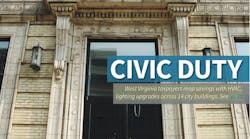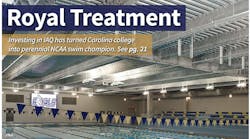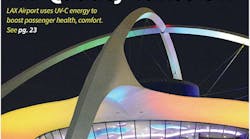Six school districts, two states, and several national organizations are working collaboratively to develop zero-energy design that is cost-competitive with conventional construction as part of the U.S. Department of Energy’s (DOE’s) recently launched Better Buildings Zero Energy Schools Accelerator.
A zero-energy building is a building where, on a source-energy basis, actual delivered energy is less than or equal to on-site renewable exported energy.
In conjunction with the launch of the Zero Energy Schools Accelerator, DOE officials and other key stakeholders toured Discovery Elementary School in Arlington, Va., a zero-energy school that officially opened its doors in September 2015. Discovery’s engineering team expects to offset its energy usage with renewable energy and to save about $75,000 within its first year of operation.
One of 40 zero-energy-ready schools in the United States, Discovery Elementary was built with advanced energy-efficiency and renewable-power features, including solar rooftop and geothermal heating and cooling systems.
“Through the Better Buildings Zero Energy Schools Accelerator, partners commit to real savings,” Kathleen Hogan, U.S. DOE deputy assistant secretary for energy efficiency, said. “By using the most energy-efficient technologies and engaging students and the local community, school districts can lead the way in saving taxpayer dollars and creating more resilient and first-in-class educational facilities.”
Zero-energy schools have the potential to reduce energy consumption by 65 to 80 percent, depending on the climate zone.
The goal of the Better Buildings Zero Energy Schools Accelerator is to quickly make zero-energy K-12 schools more mainstream. Partner school districts commit to developing a zero-energy plan for a project within a year. They can engage with fellow states and school districts and leverage support from regional and national organizations, including the National Renewable Energy Laboratory, Northeast Energy Efficiency Partnerships, the National Energy Education Development (NEED) Project, Southern California Edison, The Energy Coalition, the New Buildings Institute, the Rocky Mountain Institute, and the National Association of State Energy Officials.
Participants include:
- Hermosa Beach City School District, Hermosa Beach, Calif.
- LA Unified School District, Los Angeles.
- Arlington School District, Arlington, Va.
- Boulder Valley School District, Boulder, Colo.
- Adams 12 – Five Star Schools, Thornton, Colo.
- Douglas County School District, Douglas County, Colo.
- State of Minnesota Schools.
- State of California Schools.










